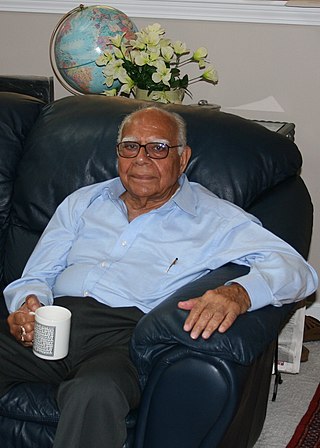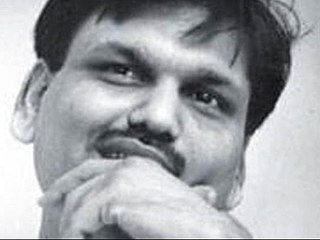Related Research Articles

Ram Boolchand Jethmalani was an Indian lawyer and politician. He served as India's Union Minister of Law and Justice, as chairman of the Indian Bar Council, and as the president of the Supreme Court Bar Association.

The Attorney General for India is the chief legal advisor of the Government of India. The Attorney General is appointed by the President of India at the instance of the Union Cabinet under Article 76(1) of the Constitution and hold office during the pleasure of the President. The Attorney General must meet the qualifications necessary for an appointment as a Judge of the Supreme Court. Therefore, the Attorney General should have served as a judge in a high court for a minimum of five years, or as an advocate in a high court for at least ten years. Alternatively, the President may consider an individual as eligible for the role if they are deemed an eminent jurist.

The Solicitor General of India (SGI) is subordinate to the Attorney General for India. The SGI is the second-highest law officer of the country, assists the Attorney General, and is assisted by Additional Solicitors General of India (Addl. SGIs). The SGI and the Addl. SGIs advise the Government and appear on behalf of the Union of India in terms of the Law Officers (Conditions of Service) Rules, 1972. However, unlike the post of Attorney General for India, which is a Constitutional post under Article 76 of the Constitution of India, the posts of the Solicitor General and the Additional Solicitors General are merely statutory.

Harshad Shantilal Mehta was an Indian stockbroker and a convicted fraudster. Mehta's involvement in the 1992 Indian securities scam made him infamous as a market manipulator.

The Faculty of Law, University of Delhi is the law department of the University of Delhi. It has the unique distinction of producing the largest number of sitting judges of the Supreme Court of India, with many notable alumni's from various fields.

Marpadi Veerappa Moily is an Indian politician belonging to the Indian National Congress from the state of Karnataka. Moily was the former Chief Minister of the Indian state of Karnataka.
Additional Solicitor General of India abbreviated as Addl. SGI is a law officer of India who assists the Solicitor-General and the Attorney-General. Addl. SGI is governed by Law Officers Rules, 1987.

Abhishek Manu Singhvi is an Indian senior advocate and politician. As politician, he is a member of the Indian National Congress (INC) and a member of the Parliament of India representing Telangana in the Rajya Sabha, the Upper House of the Indian Parliament, since August 2024. He is also a spokesperson for the INC. He is one of the senior advocates of the Supreme Court of India.

Gopal Subramanium is an Indian lawyer, international arbitrator, academic and Senior Advocate who practices primarily in the Supreme Court of India and the Delhi High Court. He served as the Solicitor General of India 2009–2011 and Additional Solicitor General of India 2005–2009. He served as Chairman of the Bar Council of India 2010–2011.

In India, black money is funds earned on the black market, on which income and other taxes have not been paid. Also, the unaccounted money that is concealed from the tax administrator is called black money. The black money is accumulated by the criminals, smugglers, and tax-evaders. Around ₹22,000 crores are supposed to have been accumulated by the criminals for vested interests, though writ petitions in the supreme court estimate this to be even larger, at ₹900 lakh crores.
Gourab Banerji is a Senior Advocate appearing in varied cases before the Indian courts and in many domestic and international arbitrations in India and overseas. He is an alumnus of Cambridge University (1986-1989), from where he graduated with First Class Honours, and has been practicing in India since 1990. As an Additional Solicitor General of India in the Supreme Court (2009-2014), he represented the Union of India in many sensitive and landmark cases. Banerji has also been appointed amicus curiae by the Courts in several matters relating to land laws, international commercial arbitration, Supreme Court practice and procedure, as well as indirect tax. He is also an Overseas Associate at the Essex Court Chambers, London.
Mohan Parasaran is a Senior Advocate at the Supreme Court of India. In February 2013 he was appointed the Solicitor General of India and continued in this post till May 2014. He served as part of the Congress led UPA 2 government. Previously he held the post of Additional Solicitor General of India for nine years. In 2012, he resigned from the post of Additional Solicitor General but the resignation was not accepted by the Government. He was designated senior advocate in 2002.
Raju Ramachandran is a senior advocate at the Supreme Court of India and a former Additional Solicitor General. He served as an amicus curiae for the Supreme Court of India in the 2002 Gujarat riots case and in the appeal of Ajmal Kasab in the 2008 Mumbai attacks case.
The Sahara -SEBI case is the case of the issuance of Optionally Fully Convertible Debentures issued by the two companies of Sahara India Pariwar to which Securities and Exchange Board of India had claimed its jurisdiction and objected on why Sahara has not taken permission from it.
JSW Bhushan Power & Steel Limited formerly known as Bhushan Power & Steel Limited is a steel company that is engaged in the manufacturing and marketing of steel products. It was established in 1970. In July 2019, BPSL was allegedly involved in fraud worth ₹3805.15 crore rupees, as detected by Punjab National Bank. It is one of India's most indebted companies and appears among the 12 companies referred by the Reserve Bank of India (RBI) to a bankruptcy court for the purpose of debt resolution.
The INX Media case refers to an ongoing high-profile money laundering investigation in India. It involves allegation of irregularities in foreign exchange clearances given to INX Media group for receiving overseas investment in 2007. P. Chidambaram was union finance minister at the time. His son Karti Chidambaram has been implicated by the investigating agencies.
The 1992 Indian stock market scam was a market manipulation carried out by Mr Harshad Mehta and politicians on the Bombay Stock Exchange. That scam caused significant disruption to the stock market of India, defrauding investors of over ten million USD.

Sanjay Jain is a prominent Indian lawyer and former Additional Solicitor General of India. His legal career is marked by significant contributions to various fields of law, including constitutional issues, taxation, insolvency and public interest litigation.
The Prime Minister's Citizen Assistance and Relief in Emergency Situations Fund was created on 27 March 2020, following the COVID-19 pandemic in India. Although it is named for the Prime Minister of India, and uses the State Emblem of India, it is a private fund, used at the discretion of the Prime Minister and the Fund's trustees, and does not form a part of the Government of India's accounts. The Fund was established for the purpose of redressing the COVID-19 pandemic in India, in 2020. While complete documentation for the Fund's establishment has not been made public, the Government of India has stated that the Prime Minister of India, Narendra Modi, is the chairman of the fund, and that trustees include the Minister of Defence, Rajnath Singh; the Minister of Home Affairs, Amit Shah, the Minister of Finance, Nirmala Sitharaman, and several corporate leaders and industrialists, including Ratan Tata, and Sudha Murty.
Roshan Dalvi is a former judge of the Bombay High Court, in Maharashtra, India. She adjudicated a number of widely reported and significant cases during her career as a judge, including the dispute between the children of Shiv Sena leader Bal Thackeray regarding their inheritance, and the challenge to a Maharashtra law forbidding dancers in bar from carrying on their profession.
References
- ↑ "Bishwajit Bhattacharya". India Law Journal. Retrieved 31 October 2022.
- ↑ "Law Ministry of India's website". Archived from the original on 27 December 2016. Retrieved 21 June 2012.
- ↑ The Statesman 'Appointments/Briefs'
- ↑ Venkatesan, J. (August 2013). "Centre's probe into Harshad Mehta fraud eyewash, says Supreme Court". The Hindu.
- ↑ "The Kathmandu Post".
- ↑ "The Deccan Herald".
- ↑ "India Law Journal". Wayback Machine. 18 March 2008. Retrieved 17 August 2024.
- ↑ "Former top law officer accuses govt of botching up crucial cases in Supreme Court". India Today. 16 November 2012.